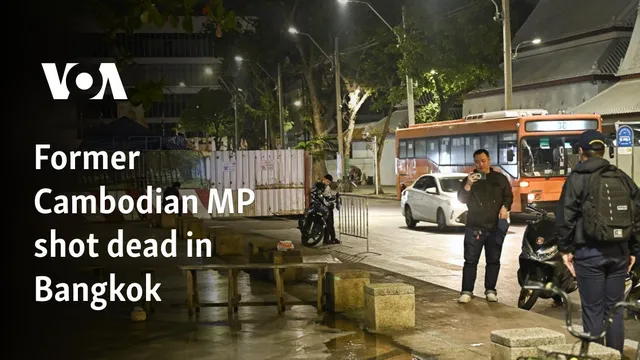
Former Cambodian MP Lim Kimya assassinated in shocking Bangkok shooting
2025-01-09 10:48- Lim Kimya was shot near a Buddhist temple in Bangkok shortly after arriving in Thailand.
- The suspect, a Thai national and former marine, is believed to have targeted Lim Kimya as part of a politically motivated attack.
- The assassination raises severe concerns regarding the safety of exiled political figures in Thailand and suggests an escalation of transnational repression.
Express your sentiment!
Insights
Cambodia faced a shocking incident involving the assassination of a prominent political figure, Lim Kimya, who was killed on January 9, 2024, in Bangkok, Thailand. Lim Kimya, a former member of the opposition Cambodia National Rescue Party (CNRP) and a dual citizen of Cambodia and France, was shot near Wat Bowonniwet Vihara Ratchaworawihan, a Buddhist temple located in the vibrant tourist area of Khao San Road. This brutal attack occurred just hours after Lim Kimya arrived in Thailand with his wife, raising grave concerns about the safety of political exiles in the region. The investigation into the murder revealed that the perpetrator, who remains at large, was a Thai national with a military background, specifically a former marine. Thai police noted that the assailant had been waiting for Lim Kimya's arrival and fired three shots, striking him fatally before fleeing on a motorbike. The killing sparked outrage among Cambodian opposition members and human rights advocates, who viewed it as a clear act of political violence linked to the oppression of dissent in Cambodia. In recent years, political repression in Cambodia has intensified under the government of Hun Sen, who ruled the country for nearly four decades before stepping down in 2023. Many opposition leaders, including Lim Kimya, have been targeted, leading to arrests, deportations, and in some cases, assassinations. Sam Rainsy, a former leader of the CNRP, accused Hun Sen of orchestrating the murder, claiming it fits a pattern of politically motivated violence against opposition figures. The CNRP, which was dissolved ahead of the 2018 elections, has denounced the killing as both inhumane and a continuation of the regime's violent tactics against dissent. This incident not only highlights the peril facing Cambodian activists abroad but also raises alarm about Thailand's role as a refuge for those escaping persecution. Some experts believe Lim Kimya's assassination represents a grim escalation in transnational repression, as authoritarian regimes increasingly target critics beyond their borders. Human rights organizations have called for a thorough investigation into the circumstances surrounding the shooting to ensure justice and accountability for this heinous act. As investigations continue, Lim Kimya's murder serves as a stark reminder of the risks faced by political dissidents and underscores the need for greater protections for individuals seeking asylum from repressive regimes. The case has implications for the broader struggle for democracy and human rights in Cambodia and the security of exiled political figures in Thailand and elsewhere.
Contexts
Political assassinations in Cambodia have been a significant and often grave concern throughout the nation’s modern history, deeply intertwined with its turbulent political landscape. The legacy of political violence has roots dating back to the Khmer Rouge regime in the 1970s, which saw an extensive campaign of purges and assassinations. This dark period established a precedent, creating a culture of fear that has persisted in subsequent decades. Even after the fall of the Khmer Rouge, political power struggles continued to manifest in targeted assassinations, particularly against opposition leaders, government officials, and activists who challenge the ruling powers. The implications of such targeted violence have had profound effects on the fabric of Cambodian society, stifling political discourse and impeding democratic progress. In the contemporary context, assassinations in Cambodia have been characterized by a systematic approach targeting individuals who oppose or threaten those in power. Notably, the assassination of opposition leader Kem Ley in 2016 sparked international outrage and ignited protests against the government, highlighting the risks faced by dissenters in Cambodia. Such events not only accentuate the fragility of political opposition but also reveal a troubling willingness among those in authority to resort to lethal measures to maintain their grip on power. Investigations into these cases often lead to accusations of government collusion or incompetence, raising questions about law enforcement's effectiveness and independence. International reactions to political assassinations in Cambodia have varied, with human rights organizations consistently condemning such acts as violations of fundamental rights. Activists and foreign observers have urged for accountability and reform within Cambodia’s political system, emphasizing the need for transparent investigations into assassinations. The global community continues to focus on Cambodia’s political climate, often linking these violent acts to broader issues of governance, human rights, and the rule of law. The lack of significant legal repercussions for perpetrators of assassinations sends a disheartening message about the state of justice in Cambodia, further entrenching the cycle of violence. As Cambodia looks toward the future, the shadow of political assassinations looms large over its democracy. The historical context of violence poses significant challenges to political stability and citizen engagement. For Cambodia to move beyond this troubled legacy, it will require a concerted effort to address the underlying issues of political power dynamics, strengthen legal frameworks, and foster an environment that genuinely upholds democratic ideals. The path forward must include a commitment to protecting individuals who dare to speak out against injustices, ensuring that Cambodia can cultivate a political culture where dialogue, tolerance, and safety prevail.